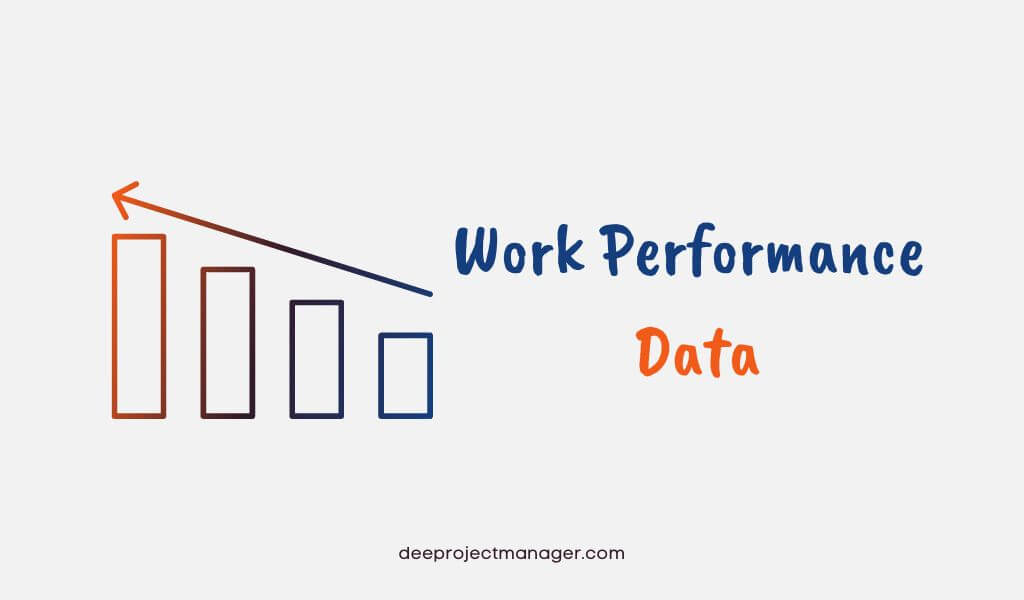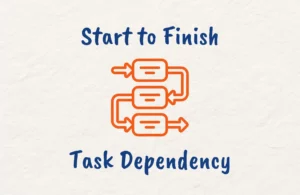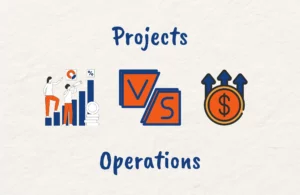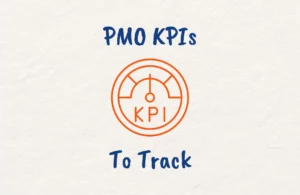For any project you manage, one key aspect that could determine its success or failure is how you track and analyze the project’s data. This is a necessary process and even more critical is work performance data.
This article will give you a comprehensive insight into work performance data in project management, its importance and relevance to the overall process, how to collect and analyze, and tools that will help you make informed decisions for your projects.
What is Work Performance Data in Project Management?
Work performance data in project management are raw observations and measurements collected during the life cycle of a project.
This data is output from most processes of the project management executing process group.
These data when analyzed form the work performance information which is key in gauging the progress of the project and how effective the project team and processes are.
Work performance data can include metrics such as:
- Time spent on tasks and activities
- Cost of resources
- Quality of deliverables
- Team member performance
- Risks and issues encountered
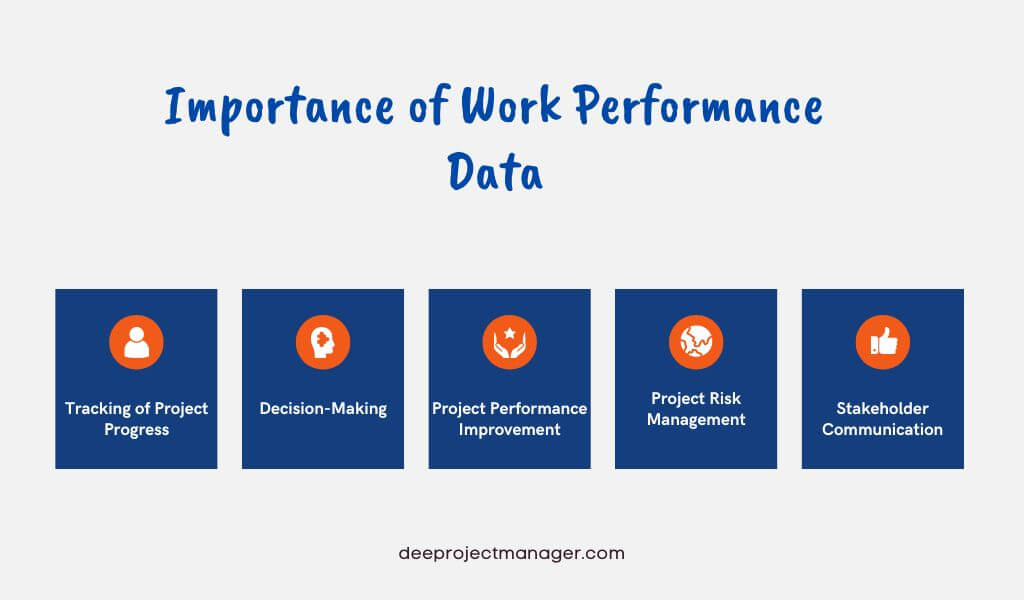
Importance of Work Performance Data in Project Management
Work performance data is invaluable in project management for a ton of reasons. Some of these include:
1. Tracking of Project Progress
Work performance data is essential to tracking the progress of any project by comparing the data to the project plans, deliverables, and baselines.
This way, it can be ascertained if the project is progressing on schedule and within the allocated budget.
2. Decision-Making
From the analysis of the gathered work performance data, work performance information is gleaned. It helps you as a project manager make informed decisions about your project to keep it on the right track.
Some decisions could be to reallocate resources or adjust the timelines.
3. Project Performance Improvement
By identifying patterns and trends in your project work performance data, you have an ideal opportunity as a project manager to address spotted inefficiencies and take the necessary corrective actions.
4. Project Risk Management
Risk management remains key to successful project management, and tracking work performance data can aid in this.
From the work performance data, potential risks and issues can be identified early giving an opportunity to take corrective and preventive actions proactively.
5. Stakeholder Communication
With accurate work performance data, there’s transparent communication with the project stakeholders which helps in building and maintaining trust, as well as managing expectations.
Key Performance Indicators (KPIs)
Key Performance Indicators (KPIs) in project management are quantifiable metrics that provide insight into the performance of a team or project.
As a project manager, you need to establish relevant KPIs to effectively track and analyze work performance data. Some common KPIs in project management are:
- Schedule performance index (SPI)
- Cost performance index (CPI)
- Schedule variance (SV)
- Cost variance (CV)
- Quality metrics
Collecting Work Performance Data in Project Management
A systematic approach is required for the collection of accurate work performance data. Using the following steps can be very helpful in this process:
1. Define Data Requirements
It’s important to first of all know the project metrics and determine the types of data that are most relevant to your project and establish how frequently they should be collected.
2. Select Data Sources
When the data requirements have been determined, then the next step is to identify the sources which the data is to be collected from.
These sources could be time-tracking tools, project management software, Project Management Information System (PMIS), or team member self-reports.
3. Establish Data Collection Processes
Then develop processes for collecting the work performance data, and assign responsibilities for the tasks that make up the processes.
Ensure that the team members with these responsibilities understand the importance of accurate reporting of data.
4. Implement Data Collection
Having laid the foundations for collecting work performance data and assigned responsibilities to team members, use tools that facilitate data collection, such as timesheets, automated reporting systems, or project management software to collect the data.
Analyzing Work Performance Data in Project Management
When you have collected the work performance data, it’s meaningless without analysis to get work performance information and use it to draw meaningful insights.
Consider using the following steps:
- Aggregate the data: Compile the work performance data from the different sources into a centralized system like the Project Management Information System (PMIS) for analysis.
- Compare data to KPIs: The next thing to do is to analyze the data by evaluating it against the established KPIs to determine if there are variances or if the project is on track.
- Identify patterns and trends: From the data analysis, identify patterns and trends of the project such as recurring issues or consistently underperforming members of the team.
- Communicate findings: Share the insights that have been gathered from the analysis of the work performance data with stakeholders and team members so as to inform decision-making and drive performance improvements.
- Adjust project plans: Using insights from the analysis of the project’s work performance data, make adjustments to the project’s scope, schedule, budget, and resources as needed.
Tools for Managing Work Performance Data in Project Management
As a project manager, tools are necessary to make your life easier and focus on delivering value instead of doing the manual lifting.
When it comes to collecting, analyzing, and managing work performance data, there are several project management tools that you can use for this:
1. Project Management Software
There are platforms that offer features for tracking work performance data, including time tracking, task management, and reporting.
Some of these platforms are Trello, Asana, and Microsoft Project.
2. Time Tracking Tools
Aside from the aforementioned platforms, there are time-tracking software like Harvest, and Toggl that can help capture accurate data on time spent on various tasks by team members.
3. Data Visualization Tools
Data visualization tools like Tableau and Power BI can help in analyzing and visualizing work performance data in project management.
This way, you have visual insights and can thus identify patterns and trends more easily.
Common Challenges and Best Practices
Collecting and analyzing work performance data can present challenges. Here are some common issues and best practices to address them:
1. Inaccurate Data
Encourage team members to report data accurately by emphasizing its importance and creating a culture of accountability. Implement data validation checks and periodic audits to ensure data quality.
2. Data Overload
Focus on collecting and analyzing only the most relevant data for your project. Avoid overloading your team with unnecessary data collection tasks, and prioritize essential KPIs.
3. Lack of Stakeholder Buy-in
Communicate the value of work performance data to stakeholders, and demonstrate how it can lead to better decision-making and improved project outcomes.
4. Resistance to Change
Introduce new data collection processes gradually and provide training and support to help team members adapt. Emphasize the benefits of accurate work performance data for both the team and the project as a whole.
5. Data Security
Ensure that your data collection and storage processes comply with relevant data protection regulations. Implement strong access controls and encryption to protect sensitive work performance data.
Conclusion
In conclusion, work performance data is crucial for effective project management.
By understanding its importance, establishing relevant KPIs, and employing systematic data collection and analysis processes, you can make informed decisions, improve team performance, and ultimately deliver successful projects.

